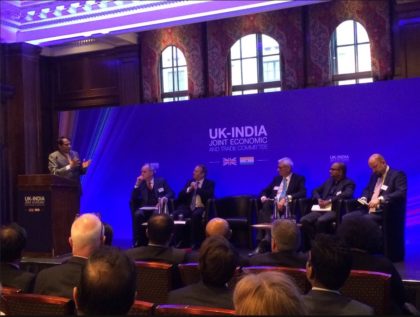India, UK and the Commonwealth

With CHOGM taking place in London in April, there is a growing focus in the UK government building stronger trade relations as it prepares to leave the EU.
India, too, is upping its engagement. As High Commissioner Sinha said, India’s approach to the commonwealth has been one of “benign neglect”.
Neither country is neglecting it right now. Both Mr Prabhu and the UK’s Secretary of State for International Trade, Dr Liam Fox, referred to it in their speeches at the JETCO plenary on 11 January. The joint statement noted that “the ministers looked forward to the upcoming Commonwealth Heads of Government Meeting in April 2018 at which India and the UK will work together to boost intra-commonwealth trade.”
So why, according to Mr Prabhu, is the commonwealth important as a trading bloc?
Recent years have witnessed a growing interest from India in the untapped potential of the Commonwealth as a trade and investment bloc – both from the government and private sector.
Given the similarities between the commonwealth countries (language, democracy, and rule of law), Mr Prabhu believes that there is a huge opportunity to strengthen these linkages and rejuvenate the organisation through trade and investment.
As such, close partners and two of the Commonwealth’s largest economies, the UK and India have a pivotal role to play to help develop the Commonwealth into a major trading bloc.
A thriving Commonwealth trading bloc will in turn, Mr Prabhu pointed out, act as a growth engine for the global economy.
While the minister displayed clear political enthusiasm for greater Commonwealth trade and investment, he stressed that businesses should take the lead as it is companies that buy, sell, partner and invest. He also invited ideas from businesses on what the government should do.
He didn’t have to wait long as, during the panel discussion and q & a, businesses pointed out that to achieve above-trend growth in infra-commonwealth trade and investment, Governments need to continue to remove non-tariff barriers (i.e. ease of doing business issues), and to facilitate labour mobility between the Commonwealth’s member countries.
Of course, looking just at the UK and India, there are positive developments on both points. India’s improving ranking in the World Bank’s ease of doing business ranking, and measures like the UK-India joint trade review, are steps in the right direction.
And, the fact that Indians receive more UK work visas than the rest of the world combined demonstrates that mobility is strong, at least between India and the UK.
So, to unlock the potential of the Commonwealth as a trade and investment bloc, the UK-India partnership could be replicated and expanded.

 By Tara Panjwani
By Tara Panjwani 

